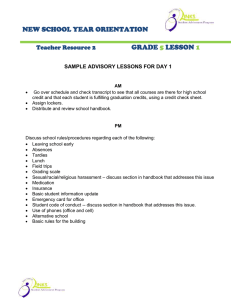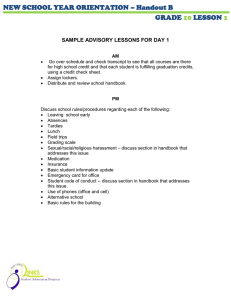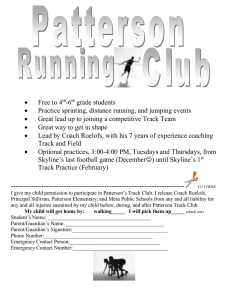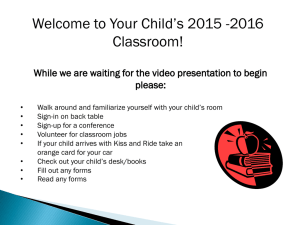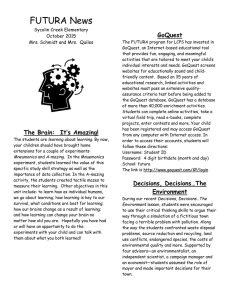Mr.Patterson’s Class Parent Handbook 2015 - 2016
advertisement
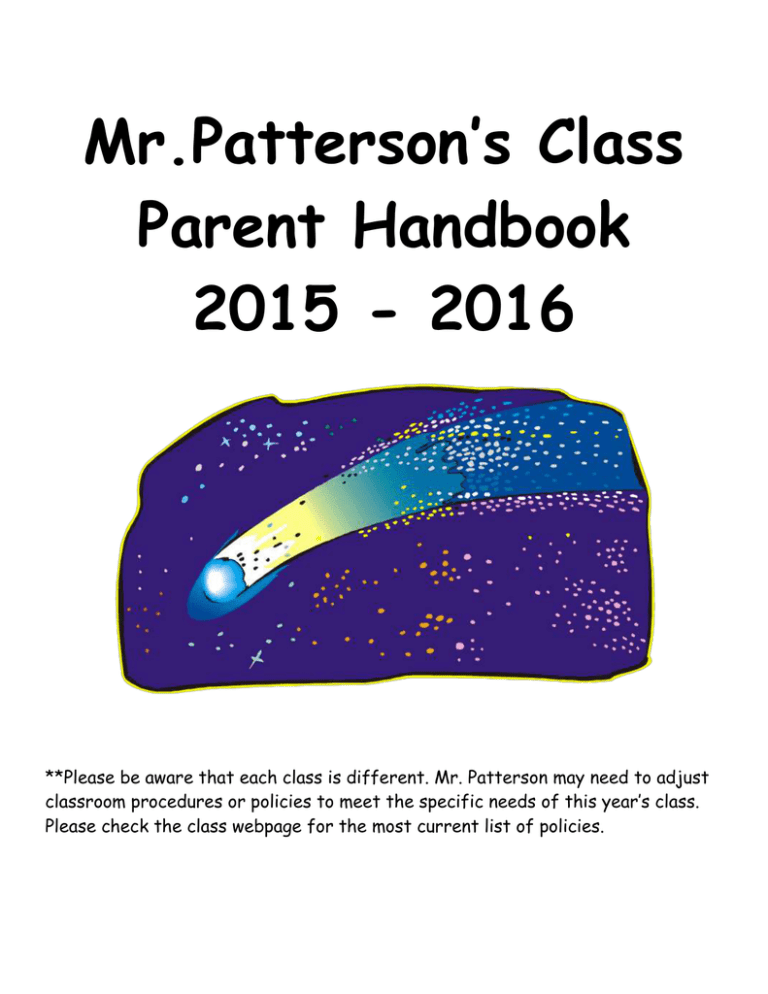
Mr.Patterson’s Class Parent Handbook 2015 - 2016 **Please be aware that each class is different. Mr. Patterson may need to adjust classroom procedures or policies to meet the specific needs of this year’s class. Please check the class webpage for the most current list of policies. Inspirational Quotes Upon the subject of education, not presuming to dictate any plan or system respecting it, I can only say that I view it as the most important subject which we as a people may be engaged in. -Abraham Lincoln In an effective classroom students should not only know what they are doing, they should also know why and how. -Harry Wong Education is the most powerful weapon which you can use to change the world.” Nelson Mandela Anyone who stops learning is old, whether at twenty or eighty. Henry Ford A little consideration, a little thought for others, makes all the difference." - Eeyore Table of Contents Welcome Letter ……………………………………………………………………………………………………………………1 Curriculum Map ………………………………………………………………………………………………………………… 2-5 Class Schedule ………………………………………………………………………………………………………………………6 Assessment and Grading …………………………………………………………………………………………………….7 K-12 Assessment and Grading Common Expectations……………………………………………………8 Homework Policy…………………………………………………………………………………………………………………….9 General Homework Tips for Parents……………………………………………………………………………….10 Reading Homework ………………………………………………………………………………………………………………11 Helpful Do’s and Don’ts for Parents…………………………………………………………………………………12 Classroom Management……………………………………………………………………………………………………….13 Sample Think Sheet…………………………………………………………………………………………………………….14 Miscellaneous Information…………………………………………………………………………………………………15 Welcome Letter August 26, 2015 Dear Parents, Welcome to a new school year. Let me also take this opportunity to welcome you to our classroom community. I hope that this year will be a positive experience for both you and your child. The goal of this booklet is to get you acquainted with what will be happening in room 26 this year. I cannot explain every minute detail of our daily happenings here, but this should provide a general overview of what you and your child should expect. As each class is different, I may need to change or make adjustments during the year to meet the needs of this individual class. This packet should be a helpful resource for you throughout the year. The information presented here is also important for your child to understand. They should already be familiar with most of the information, but repetition cannot hurt. Feel free to discuss what you read here with your child. Please keep in mind that to make this an effective school year it will be necessary for us to work as a team to help your child succeed. I will keep you informed of what is happening in school through class emails, my web-site, personal email, and phone calls. I encourage you to do the same. I encourage you to contact me not only with questions and concerns, but also with good news. I also love to hear about sports games, dance recitals, play performances, and the like. Since I live locally I really enjoy coming out to support students in their roles outside of school. These activities are a big part of students’ lives and provide me with a glimpse of another side to your child. I hope that your find the information here helpful. Please feel free to contact me with any questions or concerns. Mr. Patterson Mr. Patterson’s Class Handbook 1 Curriculum Map 1st Nine Weeks Reading: Read fiction and nonfiction with fluency & accuracy ......................................................... 5.5, 5.6 Word meaning through context clues and word reference materials in a variety of texts and across content areas ................................................................................................................... 5.4 Make text-text connections ............................................................................................................. 5.5 Identify main idea and summarize supporting details ....................................................... 5.5, 5.6 Make, confirm, or revise predictions .............................................................................................. 5.5 Use prior knowledge as context for new learning ....................................................................... 5.6 Identify new information gained from reading nonfiction texts ............................................. 5.6 Written Language: Choose planning strategies for various writing purposes and identify audience ................. 5.7 Write a clear topic sentence focusing on the main idea ............................................................ 5.7 Elaborate the main idea with supporting details.......................................................................... 5.7 Adjectives and adverb comparisons ................................................................................................ 5.8 Quotation marks with dialogue ......................................................................................................... 5.8 Edit for commonly used words ......................................................................................................... 5.8 Use appropriate patterns in written work and isolation ......................................... LCENG 1 & 2 Math: Problem Solving with Whole Number Operations ........................................................................ 5.4 Prime/Composite & Odd/Even Numbers ........................................................................................ 5.3 Variables, Expressions, and Equations .......................................................................................... 5.18 Perimeter and Area ............................................................................................................................. 5.8 Distributive Property........................................................................................................................ 5.19 Order of Operations ........................................................................................................................... 5.7 Numerical and Geometric Patterns ............................................................................................... 5.17 Science: Scientific Investigation ..................................................................................................................... 5.1 Geology (Changes to the Earth, Plate Tectonics) ....................................................................... 5.7 Social Studies: Identify the five themes of geography ..........................................................................................I.1 Mr. Patterson’s Class Handbook 2 Tools of Geography ............................................................................................................................. I.2 Physical geography terms .................................................................................................. I.3, I.4, I.5 Longitude, latitude, hemispheres, regions ..................................................................... I.6, I.7, I.8 Northeast Region .................................................................................................................... II.1-II.10 2nd Nine Weeks Reading: Read fiction and nonfiction with fluency & accuracy ......................................................... 5.5, 5.6 Word meaning through context clues, sentence structure, and word reference materials in a variety of texts and across content areas ............................................................................ 5.4 Describe author’s word choice and style ....................................................................................... 5.5 Use reading strategies to monitor comprehension ............................................................. 5.5, 5.6 Use nonfiction text features............................................................................................................ 5.6 Skim material to develop an overview and locate specific information .................................. 5.6 Locate information to support opinions predictions and conclusions ...................................... 5.6 Identify new information gained from reading nonfiction texts ............................................. 5.6 Written Language: Choose planning strategies for various writing purposes and identify audience ................. 5.7 Organize writing with a central idea (main idea and supporting details) ............................... 5.7 Write multi-paragraph compositions .............................................................................................. 5.7 Use precise and descriptive words to create tone and voice ................................................... 5.7 Vary sentence with transition words .............................................................................................. 5.7 Commas to indicate interrupters ..................................................................................................... 5.8 Hyphen to divide a word at the end of line ................................................................................... 5.8 Edit fragments and run-on sentences, eliminate double negatives ......................................... 5.8 Use appropriate patterns in written work and isolation ......................................... LCENG 1 & 2 Research skills ...................................................................................................................................... 5.9 Math: Elapsed Time ....................................................................................................................................... 5.10 Decimal Place Value and Rounding .................................................................................................... 5.1 Fraction/Decimal Equivalents, Comparing, Ordering................................................................... 5.2 Probability & Sample Space............................................................................................................. 5.14 Numerical Patterns ........................................................................................................................... 5.17 Adding and Subtracting Fractions................................................................................................... 5.6 Science: Oceanography ...................................................................................................................................... 5.6 Living Systems (cells and classification of living things) ........................................................... 5.5 Mr. Patterson’s Class Handbook 3 Social Studies: Southeast Region .................................................................................................................. II.11-II.15 Middle West Region ............................................................................................................ II.16-II.25 3rd Nine Weeks Reading: Read fiction and nonfiction with fluency & accuracy ......................................................... 5.5, 5.6 Word meaning through roots, affixes, synonyms, antonyms, homophones, and word reference materials in a variety of texts and across content areas...................................... 5.4 Character development ...................................................................................................................... 5.5 Plot development and resolution of conflict(s) ............................................................................. 5.5 Cause and effect relationships ............................................................................................... 5.5, 5.6 Identify and ask questions that clarify points of view .............................................................. 5.5 Use reading strategies to monitor comprehension ............................................................. 5.5, 5.6 Use nonfiction text features............................................................................................................ 5.6 Fact and opinion ................................................................................................................................... 5.6 Identify new information gained from reading nonfiction texts ............................................. 5.6 Written Language: Choose planning strategies for various writing purposes and identify audience ................. 5.7 Organize writing with a central idea (main idea and supporting details) ............................... 5.7 Write multi-paragraph compositions .............................................................................................. 5.7 Use precise and descriptive words to create tone and voice ................................................... 5.7 Vary sentence with transition words .............................................................................................. 5.7 Plural possessives................................................................................................................................. 5.8 Interjections ........................................................................................................................................ 5.8 Apostrophes in contractions and possessives ............................................................................... 5.8 Conjunctions .......................................................................................................................................... 5.8 Use appropriate patterns in written work and isolation ......................................... LCENG 1 & 2 Research skills ...................................................................................................................................... 5.9 Math: Decimal Operations ............................................................................................................................. 5.5 Metric & Customary Measurement .................................................................................................. 5.8 Perimeter/Area/Volume with Fractions and Decimals ............................................................... 5.8 Relationships in Numerical Patterns (Conversions) ................................................................... 5.17 Geometry (Angles, Triangles, Plane Figures) .......................................................... 5.11, 5.12, 5,13 Circles ..................................................................................................................................................... 5.9 Science: Living Systems (cells and classification of living things) ........................................................... 5.5 Mr. Patterson’s Class Handbook 4 Matter .................................................................................................................................................... 5.4 Social Studies: Southwest Region ............................................................................................................... II.26-II.35 Rocky Mountain Region ...................................................................................................... II.36-II.38 4th Nine Weeks Reading: Read fiction and nonfiction with fluency & accuracy ......................................................... 5.5, 5.6 Word meaning through use of word reference materials in a variety of texts and across content areas ........................................................................................................................................ 5.4 Figurative Language............................................................................................................................. 5.4 Draw conclusions and make inferences ........................................................................................... 5.5 Poetry ..................................................................................................................................................... 5.5 Identify, compare, and contrast relationships ............................................................................. 5.6 Identify new information gained from reading nonfiction texts ............................................. 5.6 Written Language: Choose planning strategies for various writing purposes and identify audience ................. 5.7 Organize writing with a central idea (main idea and supporting details) ............................... 5.7 Write multi-paragraph compositions .............................................................................................. 5.7 Commas to indicate interrupters ..................................................................................................... 5.8 Hyphen to divide words at the end of a line ................................................................................. 5.8 Use appropriate patterns in written work and isolation ......................................... LCENG 1 & 2 Math: Stem and Leaf, Line Graphs ............................................................................................................ 5.15 Mean, Median, Mode, Range ............................................................................................................ 5.16 SOL Review Science: Light ........................................................................................................................................................ 5.3 Sound ..................................................................................................................................................... 5.2 SOL Review Social Studies: Pacific Region ..................................................................................................................... II.39-II.47 Mr. Patterson’s Class Handbook 5 Class Schedule Our classroom schedule for the 2015 -2016 school year will be posted on the class webpage once it is finalized. Please remember although I try to stick to this, times are flexible. There are times during the year when I need to change this around. We usually test when we have longer blocks of time, so students do not feel rushed. Our schedule can also change due to activities we are doing with other classes. Specials Some other schedule information: Monday DARE We will be having DARE every other week. You will be notified once the date and time are established. Tuesday Guidance Mrs. McCrea will provide guidance lessons every other week on Fridays starting September 11th. Family Life We will have six days of FLE in fifth grade. These classes are taught by a FLE teacher. You will be notified prior to the start of FLE. FUTURA Computer Lab 1:30 P.E. 2:00 FUTURA PE 2:00 Wednesday Music 8:30 Library 1:30 P.E. 2:00 FUTURA will meet on Tuesday. The fifth grade team recognizes the hard work being done by students attending FUTURA. It is an Thursday important program, to meet the needs of part of our population. This Music 2:00 being said, we cannot stop instruction on FUTURA days. This means that new concepts may be presented on FUTURA days, and classroom Friday activities may occur. Each teacher will make sure that FUTURA Art 1:30 – 2:20 students receive this information in an alternative manner. Classroom teachers will touch base with FUTURA students either when they return or during the next school day to go over what has been Daily missed. Depending on what has been covered, the teacher may or may Lunch 11:15 not require students to make up assignments from the day. As with County Policy, FUTURA students have 2 school days to make up any class work missed while they are at FUTURA. This means with FUTURA on Monday, students have until Thursday to turn in any make up class work. If you have any questions about this please contact your child’s teacher for clarification. Mr. Patterson’s Class Handbook 6 Assessment and Grading The assignments given to students serve a variety of purposes: to determine a student’s prior knowledge, to give students the opportunity to practice a skill, to assess a student’s progress on a skill, or to determine a student’s mastery of a skill. Types of Assessments Diagnostic – Given to a student before instruction has occurred. These assessments will have no effect on a student’s report card. Formative – Given to a student during instruction. It is assumed the student is still learning the skill. Summative – Given to a student after instruction has occurred. How assignments will be assessed Student work will be assessed on a numerical score to indicate their progress towards a desired standard. (4-Exceeding the Standard, 3-Meeting the Standard, 2-Progressing towards the Standard, 1-Below the Standard) Work is not marked based on the number correct/wrong, but on a full picture of how the student performed on the assessment. Students may earn an exact 1, 2, 3, or 4, or they may earn a decimal between two of these numbers. A 3.5 would indicate that the student has met the standard and is demonstrating mastery, but has not yet moved well beyond the standard expectation. Parent Portal This year a new grading system will be introduced called Phoenix. Parents will still be able to login and view their child’s progress in all subject areas. Much more information will be coming to you in the upcoming weeks. Please refer to the following site for more information: http://www.lcps.org/domain/12228 Mr. Patterson’s Class Handbook 7 K-12 Assessment and Grading Common Expectations VISION: LCPS IS COMMITTED TO QUALITY ASSESSMENT AND GRADING PRACTICES WHEREBY ALL TEACHERS CAN DESIGN ASSESSMENTS WHICH ALIGN WITH STANDARDS AND PROVIDE FEEDBACK TO IMPROVE STUDENT LEARNING. The following are lists of common expectations. QUALITY ASSESSMENT AND GRADING PRACTICES Assessment of student learning is an essential component of the teaching and learning process. 1. Quality assessment involves timely feedback imbedded in the learning experience. 2. A variety of formative assessment is included in each lesson. 3. Formative assessment is used to adjust instruction in order to move students to learning targets. 4. Summative assessments are linked to standards within content area. 5. Quality assessment ensures that students are involved in and parents are informed of the process. 6. Common assessment and grading practices requires collaborative effort among teachers. 7. Grades reflect student mastery, multiple efforts and student growth within a grade level or specific subject area. 8. Learning progressions are available for use as scaffolds for learning and instruction. Phoenix Using the Phoenix parent portal, teachers communicate to students and parents how assignments, assessments, and grades are tied to intended learning targets. Best practice suggests: 1. Teachers regularly update information in their grade book(s) which includes: a. Posting assignments and assessments as assigned. b. Providing useful course/assignment descriptions. c. Recording grades every ten instructional days. d. Linking no more than 2-3 standards to a single assessment. 2. Teachers use course narratives to communicate common expectations and assessment/grading practices. 3. Teachers align assessment and grading practices within school parameters regarding weighting, homework, categories, retesting, etc. Mr. Patterson’s Class Handbook 8 Homework Policy Homework Load Students will have approximately 45 minutes of homework each night. This includes long-term projects and independent reading time. Assignments I work hard to make sure that the homework I send is meaningful and appropriate. In the same respect I expect that students take their homework seriously and complete it each night with care. Most evening’s homework will be the same. Students will be expected to read for a minimum of 20 minutes per night. (Please refer to the specifics about reading homework.) Students will also have word study homework each night. These assignments will be consistent from week to week and students will know what to expect. Math homework will be assigned most nights to review the concepts covered during the day. Occasionally I may also assign an additional short assignment to enhance what is being completed in school. If students are preparing for an exam that is also considered homework. Each day all assignments will be written on the classroom assignment board. Students will be provided with ample time to copy homework into their agenda and collect the materials they will need to complete the assignments. Projects Periodically throughout the year students will be assigned long term projects. Students will be provided with exact directions, expectations and due dates so they may plan and work accordingly. I also include a copy of the rubric that I will use to grade the project. Most projects also include an oral presentation of the work that has been completed. Absence When a student is absent is it his/her responsibility to make up the work. The student has 1 week from the day they return to complete missing work, unless they talk to me to make other arrangements. After one week the work is considered missing. I do expect that students will complete their nightly reading assignment and word study (if they have their words) whether they are in school or not. Mr. Patterson’s Class Handbook 9 General Homework Tips for Parents Make sure your child has a quiet, well-lit place to do homework. Avoid having your child do homework with the television on or in places with other distractions, such as people coming and going. Make sure the materials your child needs, such as paper, pencils and a dictionary, are available. Ask your child if special materials will be needed for some projects and get them in advance. Help your child with time management. Establish a set time each day for doing homework. Don't let your child leave homework until just before bedtime. Think about using a weekend morning or afternoon for working on big projects, especially if the project involves getting together with classmates. Be positive about homework. Tell your child how important school is. The attitude you express about homework will be the attitude your child acquires. When your child does homework, you do homework. Show your child that the skills they are learning are related to things you do as an adult. If your child is reading, you read too. If your child is doing math, balance your checkbook. When your child asks for help, provide guidance, not answers. Giving answers means your child will not learn the material. Too much help teaches your child that when the going gets rough, someone will do the work for him or her. When the teacher asks that you play a role in homework, do it. Cooperate with the teacher. It shows your child that the school and home are a team. Follow the directions given by the teacher. If homework is meant to be done by your child alone, stay away. Too much parent involvement can prevent homework from having some positive effects. Homework is a great way for kids to develop independent, lifelong learning skills. Stay informed. Talk with your child's teacher. Make sure you know the purpose of homework and what your child's class rules are. Help your child figure out what is hard homework and what is easy homework. Have your child do the hard work first. This will mean he will be most alert when facing the biggest challenges. Easy material will seem to go fast when fatigue begins to set in. Watch your child for signs of failure and frustration. Let your child take a short break if she is having trouble keeping her mind on an assignment. Reward progress in homework. If your child has been successful in homework completion and is working hard, celebrate that success with a special event (e.g., pizza, a walk, a trip to the park) to reinforce the positive effort. Mr. Patterson’s Class Handbook 10 Reading Homework Many students do not see reading as homework, as there is nothing to turn in each day. In reality, the time spent reading each day, is one of the most valuable ways students can spend their homework time. Therefore, reading each night will be a consistent an important part of nightly homework. Students should find a quiet spot anywhere in their home to read a text of their own choice. Each week students are required to read 100 minutes. It is recommended that the reading be completed a little at a time throughout the week, but as we all have busy schedules, it may be completed in fewer sessions. The books students are reading should be recorded on their reading log, in their agenda. The log is a list of books, both finished and abandoned. The goal is for students to read book to completion, but we all know we encounter books that are not the right fit for us. Therefore it is important for students to understand that they may abandon a book when appropriate. Students will also be reading each day in class. A few times each quarter students will be writing me letters about what they are reading. Complete directions and expectations will be outlined in their Reading Notebooks. Mr. Patterson’s Class Handbook 11 Helpful Reading Dos and Don’ts for Parents Do help your child find reading materials that are interesting and within his range of reading levels. Remember that a child’s independent reading level is usually about a grade level below his instructional level. Text can include fiction, nonfiction, magazines (with appropriately leveled text), and kids’ newspapers, or newsletters. Do set aside time for your child to read. Have her turn off the television, radio, or computer and snuggle up with a good book. Do model reading for your child. Let him see you reading the newspaper, a novel, or a magazine. Enthusiastically share interesting snippets that you read about so he sees how enjoyable reading can be. Do ask her if she is enjoying the text. If she says no, help her find something she would prefer, or tell her to ask her teacher for assistance. Do make sure your child saves enough time to write a thoughtful reading response each week. This can be done after any reading – doesn’t have to be pushed off until the end of the week. Do celebrate your child’s success and growth in reading. Don’t push your child to read books that are too difficult-this is the time for practice, not instruction. You may want to step in though if your child is rereading the same picture books he read in much earlier grades. Check with you child’s teacher if you are unsure. Don’t just leave it up to your child to find time to read and then sign the verification form unless you are certain she has read. Don’t inundate your child with so many new texts that he feels overwhelmed-put a few books away for when he is done with what he is currently reading. Don’t use reading as punishment-ever. Also, don’t tell your child that you never enjoyed reading, even if it is true. You are the first and most influential reading role model for your child. Don’t believe that the teacher doesn’t care whether or not the response is (a) thoughtful, (b) legible, and (c) in depth. Don’t quiz your child or make him summarize what he read. Would you enjoy reading if you had to do this? Don’t give up. It may take your child a little while to get into R4, but with patience, good books, and the loving support of parents, and teachers, your child will come around. Mr. Patterson’s Class Handbook 12 Classroom Management I believe that school should not only be a place of work, but also a place of fun. In order for our classroom to be a place where we can participate in engaging activities and active learning experiences, behavior has to be responsible and respectful. If students take responsibility for their behavior and follow Horizon’s three C’s (Caring, Cooperation, and Courtesy) as well as our classroom rules of Being Respectful and Helping Themselves Learn. Then, our classroom will be an environment conducive to learning. Our classroom will be using the website/app Class Dojo to track individual positive and negative behaviors. Parents and students will be able to go onto Class Dojo on a nightly basis and track their student’s individual behavior. To get a sample of how Class Dojo works please view the following video https://www.youtube.com/watch?v=KaeNSYJvrn0. The great thing about Class Dojo is that it focuses on positive behavior. Students will be able to earn points when it is observed that they are helping themselves learn, being respectful and displaying teamwork. Once a month, as students earn positive points they will be able to purchase items from the class store or certain class privileges. With their allotted points. Once they purchase something their points will be reset and they will begin the process of earning points again. At times students make the wrong choice and as a result, I believe there must be some form of consequence. If students receive two negative points on Class Dojo they will have a private conference with Mr. Patterson in order to try and fix the problem. If the behavior proceeds to a third infraction they will be filling out a Think Sheet (that must be brought home, signed, and returned the following day). Students may also receive a Think Sheet if they display a behavior that I believe needs an immediate consequence. There may be situations where a conference may be held in order to best help your child be a successful member of the classroom. If poor behavior becomes a chronic problem or a behavior is displayed that requires an administrator the student will receive an office referral. In the event of an office referral the parents will be contacted by an school administrator. Mr. Patterson’s Class Handbook 13 Sample Think Sheet: Mr. Patterson’s Fifth Grade Class Think Sheet 1. What school expectation did I not follow? __________________________________________________ ______________________________________ 2. What exactly did I do to not meet this expectation? __________________________________________________ __________________________________________________ __________________________________________________ __________________________________________________ 3. What choice should I make in the future so this problem does not occur again? __________________________________________________ __________________________________________________ __________________________________________________ __________________________________________________ ____________________ Student Signature ________________ Date _______________ Parental Signature ________________ Date _______________ Teacher Signature ________________ Date_________________ Mr. Patterson’s Class Handbook 14 Miscellaneous Information Email This is the best way to reach me. I check my email at various times throughout the day. There are also times when I check my email in the evenings and on weekends, when I cannot be reached at school. I try to reply to emails within 24 hours, although there are occasionally circumstances that prevent me from doing so. My email address is william.patterson@lcps.org Web Page I keep and maintain a class web page. This is the place to go to find out the latest happenings. Special events, homework assignments, and other important dates can be found here: http://www.lcps.org//site/Default.aspx?PageID=109894 Parties In fifth grade we have three parties each year, fall, winter, and the Fifth Grade Picnic. If you are interested in helping out, please let me know. If you were unable to sign-up at Back to School Night please just email me your interest. The more help the better. Birthdays In an effort to keep all children safe and healthy, LCPS has recently produced guidelines that do not allow any food to be brought in for a child’s birthday. Additionally, non-food gifts of any kind, to include pencils, stickers, balloons, floral arrangements, etc. should not be brought to school for a child’s birthday. We recognize that this is a significant change, but please realize that this is for the safety of all students. Your cooperation in following the new LCPS guidelines is appreciated. You may review these guidelines by visiting the LCPS webpage and clicking on the Parent Information Management System (PIM) tab located in the left column. Field Trips With a tighter budget, field trips are limited. The fifth grade will try to go on at least one major field trip. Although two small field trips are taken to view concerts at the local High School and Middle School. A large field trip will require parent chaperones. We are limited in the number of chaperones we take on trips. If more parents volunteer than spaces are available I will draw names out of a hat. More information on field trips will be sent home as the trips approach. Mr. Patterson’s Class Handbook 15
